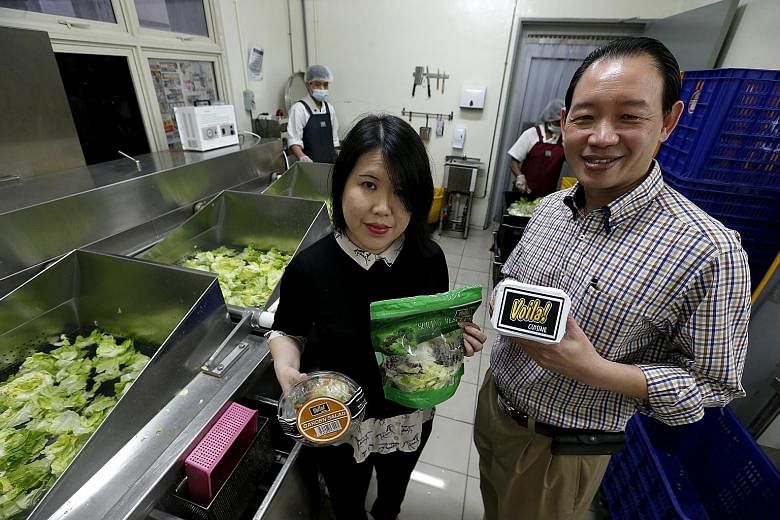Q Describe your company.
A Singapore Ace Concept (SAC) is a manufacturing company that prepares and sells salads to other businesses.
Though we are a small company, we have a huge responsibility to provide safe food, as our Voila! brand of salads is readily available in all NTUC FairPrice and Giant outlets.
We have also been supplying the same brand of lard oil to major supermarkets in Taiwan since January this year.
Q Tell us more about the ISO22000 industry standard.
A ISO22000 is a food safety management system that we applied for last year.
It ensures that companies comply with stringent food safety standards across the production line and more.
The standard is applied by our suppliers, staff and the delivery of the final products you see on the shelves.
We spent about $60,000 and the entire process of the application took six months. We were ISO-approved in December 2014.
Spring Singapore supported us on the adoption of ISO22000 through the Capability Development Grant.
Q Why did SAC decide to implement the ISO standard?
A As we have to purchase our goods from other countries, we found out that it was quite tough working without a benchmark.
In order to run our daily operations effectively, we decided to apply for the ISO22000 certificate and learn from it.
Q Does SAC package all the salads in this factory?
A Previously, we outsourced other factories to do the packaging for us. But since July last year, we decided to do everything ourselves.
By basing what we do on the ISO standard, we have tighter control over our products.
Q What are some of the benefits of implementing this industry standard?
A We are now able to better manage our manpower and reduce wastage.
With regard to reducing the wastage of vegetables, our suppliers have to adhere to ISO standards so they play their part by providing us with better and fresher vegetables.
Manpower-wise, as most of the work is machine-operated, this allows us to hire fewer people and also lower the risk of human contamination of our salads. Currently, we have 20 people on our staff.
Q It has been a year since the implementation of the ISO22000. What has it done for the revenue of the company?
A After the implementation of the industry standard, our sales increased by 25 per cent and our wastage of resources decreased by 30 per cent.
Last year, our annual revenue hit $500,000. But what is interesting is that people from overseas have approached us to find out how they can implement the ISO standard in their businesses.
Q So there are now two parts to SAC's business?
A That's right. We produce and sell salads but, at the same time, we are also consultants to others who are interested in implementing the ISO standard in their countries.
Q How many inquiries has SAC received?
A We've actually received more than 20 inquiries from various companies. But, after looking into them, we decided to work with 10 of the companiesin the food and beverage manufacturing industry.
These companies come from China, Myanmar and Taiwan.
Q What are some of SAC's latest plans?
A Currently, we are looking to export other food products sourced from NTUC FairPrice and other local suppliers to countries in Asia - such as Taiwan and mainland China.
If this plan goes through, we expect the initial sales for a year to be around $30 million.
Q Why would overseas supermarkets choose to import products from a company in Singapore?
A Singapore's stringent food safety standard is known around the world. This standard helps and creates a convincing case for us to sell our products overseas .
Q What is SAC's edge over its business competitors?
A Our working partners overseas choose to approach us because we have the ISO certificate, which is a testament to our products' quality as we can provide the safest food to consumers there.
Q What are some of SAC's overseas business plans?
A We hope to sell our factory's standard of procedure (concept and guidelines) to companies in the developing countries and help them achieve better factory management and operation.
Q What are SAC's plans for the next five years?
A No pressing need to plan for the future. Many companies worldwide face a shortage of manpower, and they cannot always maintain the best quality and standards.
But as long as we can provide safe food and further enhance good procedures, we believe that our business will continue to grow.
Q Is there anything you would like to tell your consumers?
A We cannot guarantee the cheapest or the most delicious food. But consumers can be assured that the food purchased from us has been prepared with the highest standards and is safe for consumption.

